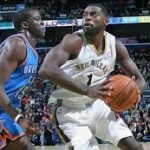 When the Pelicans gave Tyreke Evans a four-year, $44 million dollar offer sheet last summer, fans and analysts alike were skeptical of whether Evans had earned that deal.
When the Pelicans gave Tyreke Evans a four-year, $44 million dollar offer sheet last summer, fans and analysts alike were skeptical of whether Evans had earned that deal.
After several years of franchise turmoil in Sacramento, Evans’ morale was at an all time low. The former Rookie of the Year had regressed from a prolific star in the making to a streaky enigma on one of the league’s worst teams. Committing near-max money to Evans looked like a gross miscalculation by a New Orleans organization that felt an irrational urgency to become contenders by 2014.
The initial plan was to utilize Evans’ skill sets in much the same way San Antonio uses Manu Ginobili. Evans is well-sized, positionally dynamic and clever with the basketball in his hands. With as many skilled offensive players as the Pelicans have, Evans figured to fill a bunch of tiny holes.
A natural shooting guard out of high school, Evans was talented enough as a freshman at Memphis to learn point guard responsibilities on the fly under John Calipari’s tutelage and lead his team to a second seed in the NCAA Tournament. His court vision is better than his reputation as an inefficient scoring guard would allow you to assume. When he tries to facilitate, he usually does so effectively.
Regardless, the experiment of using Evans as the team’s sixth man was unsuccessful.
Evans, Jrue Holiday and Eric Gordon – otherwise known as the most disappointing backcourt trio in the league – logged a staggeringly low 256 minutes together for the entire season before Holiday went down to injury.
The Pelicans’ most star studded lineup – those three guards alongside Ryan Anderson and Anthony Davis – actually outscored opponents by 4.1 points per 100 possessions in the scant 90 minutes they shared the court together this season. Injuries kept the Pelicans from reaching absolute cohesion at full strength.
While injuries were the obvious problem, much of the team’s lack of success became Evans’ burden. The 24-year-old struggled to adapt to a reduced and inconsistent bench role and eventually grew restless.
Evans disclosed to us in early February that he had had virtually no communication with his coach. Sure enough, the rumor mill swirled that week suggesting the Pelicans were ready to give up on the Evans experiment. Whichever team was willing to take on Evans’ contract would have been able to nab him. They found no takers.
Soon afterward, Holiday was ruled out for the season following surgery on his right tibia. Guards Brian Roberts and Eric Gordon then sat a few games apiece to recover from a knee scares.
Coach Monty Williams was left with no choice; he took Evans out of his sixth man role and placed him in the starting lineup. Ever since, the Pelicans have become unrecognizably dominant.
New Orleans is 5-1 with Evans in the lineup. Several of the wins have come over quality opponents such as the Clippers, Heat and Nets. Yes, Anthony Davis is playing at a superstar level. But that has obscured Evans, who is averaging 20.7 points on 54 percent shooting with 5.8 assists, 4.8 rebounds and 2.3 steals per game over the streak.
To put it simply, Evans has changed his mental approach and it’s making him (and his team) significantly more efficient.
This season, Evans is shooting less than 22 percent from the arc but had taken more than 10 percent of his shots from deep. Since moving into the starting lineup, however, only 5 percent of his shots have come from deep (per NBA.com). In other words, he has cut his bad shots in half despite having more opportunities.
More telling of his better offensive approach, Evans has spiked his season average of 9.1 points in the paint all the way up to 15.0. His fast break points have nearly doubled from 3.2 for the season to 5.8 as well.
With more of a defined role in the offense, Evans has the freedom to control the ball and make decisions previously unavailable to him. He’s driving liberally and starting to resemble the future perennial All-Star he looked set to become in 2010.
While the success Evans has experienced as a primary ballhandler has helped him find a rapport with Anthony Davis (averaging 28.8 points and 14.0 rebounds during the streak), their pairing is still analytically average.
Evans’ insertion to the starting lineup has actually had a much stronger effect on 3-point specialist Anthony Morrow. The two have outscored opponents by 14.9 points per 100 possessions in 72 minutes over the last six games.
Maybe when all of New Orleans’ guards return healthy next season, the less versatile (and more trigger happy) Gordon would be a better fit for the team’s sixth man role.
Evans brings more versatility to the team’s defensively challenged lineup anyway. Switching Gordon for Evans in the lineup seems like a no-brainer going forward. After all, with Evans still only being 24, it’s very possible that he’ll have earned his contract by the time it’s finished.
On to the rankings.
i agree exactly with the rankings. Yeah, morris has been a revelation. But Tyreke…this is why analytics have limitations. And this is a perfect example. The Pellies are NOT better with Tyreke doing anything, except leaving town. He doesnt add versitiltiy and i cant imagine what you mean. Tyreke’s problem is that he does ONE thing. SCore in isolation. He slows down an offense. he makes other worse not better. This is what drove previous coaches nuts. He cant do else than he does…..he scores, he creates, and its a talent….but he’s not good enough at it to justify his other limitations. Harden barely justifies the fact he wont play defense. Greg Monroe…..one skill……will he get a max contract? i doubt it. Tyreke’s contract was a disaster for new orleans.